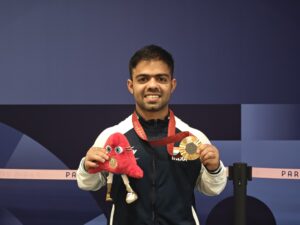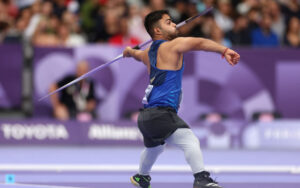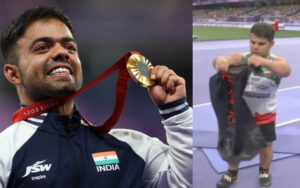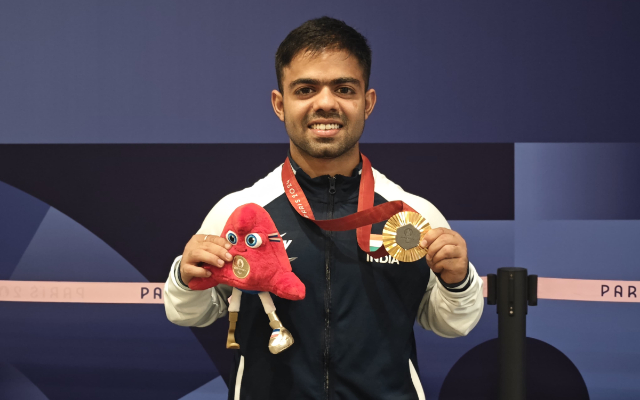
Rohan Chowdhury in Paris
India’s quest for a 25-plus medal haul at the Paris Paralympics culminated dramatically as Navdeep Singh clinched a gold medal in the men’s F41 javelin, achieving his personal best of 47.32m. What made the victory even more extraordinary was the fact that Navdeep, who initially secured the silver medal, was later upgraded to gold after Iranian thrower Sadegh Sayah Beit was disqualified for violating rule 8.1 of the International Paralympic Committee Code of Conduct, which prohibits “unsporting and improper conduct.”
Indian head coach Satyanarayana Shimoga explained that Beit was penalised for celebrating with a religious flag rather than the Iranian national flag, which constituted a violation. Beit was also seen entering the field after his final throw, another breach of the competition rules.
Navdeep’s first throw was a foul, but he made a remarkable comeback with his second attempt, launching a throw that marked his personal best and briefly set a Paralympic record. “After the first throw went foul, my coach told me it was a good throw and urged me to stay calm,” Navdeep recalled. “I knew I could do it.”
Hailing from Haryana, Navdeep’s initial foray into sports was in wrestling, a common path in his village. However, a back injury in 2011 forced him to give it up. “In my village, almost every child is sent to the ‘akhadas’ and ‘everyone is a wrestler’,” Navdeep explained. He then transitioned to running and eventually took up javelin in 2017.
For the Latest Sports News: Click Here

It was Neeraj Chopra’s gold medal at the 2016 IAAF U20 World Championship that inspired Navdeep to pursue javelin seriously. “I read in the newspaper that Neeraj from Panipat did wonders in Poland and won gold,” Navdeep said with joy. Chopra’s success motivated him to take up the sport, and it’s clear that inspiration paid off.
Navdeep’s third attempt, which won him the medal, along with his other throws that crossed 45 meters, seemed flawless. His technique, where he threw his body forward and landed on his chest as he launched the javelin, drew comparisons to Chopra’s iconic gold-winning throw at the Tokyo Olympics.
Devendra Jhajharia, current president of the Paralympic Committee of India and a legend in the sport, praised Navdeep’s performance. “I want to congratulate Navdeep for his medal and mention that his technique on the night was pin-point,” Jhajharia said. “He was effortless and confident.”
For Navdeep, who had struggled to make podium finishes in recent major events—especially with several frustrating 4th-place finishes in world championships and the Asian Para Games—this gold medal was particularly meaningful. “I can’t express myself in words,” Navdeep said. “Finally, I got to experience standing on the podium, and the national anthem was played because of me.”

Navdeep initially entered the athlete’s reporting room as a silver medallist, only to be shocked by the announcement of Beit’s disqualification. “He started crying when it was announced, and I didn’t know what was happening,” Navdeep shared. “As a fellow athlete, I tried to console him, but he was completely broken down. It felt bad.”
As the Indian contingent prepares to depart from the Paris Paralympics, the closing ceremony on September 8th at the Stade de France will feature archer Harvinder Singh and runner Preethi Pal as the flag bearers. India’s tally of 29 medals—7 golds, 9 silvers, and 13 bronzes—marks a significant step forward for the nation’s Paralympic movement.
On the final day of competition at the Stade de France, India secured two more medals: a bronze from Simran Vats in the Women’s T12 200m and Navdeep’s gold in javelin. In a fitting conclusion to the event, the last national anthem played at the Stade de France during this Paralympics was India’s — rescheduled due to the chaos. It was a moment of immense pride for all the Indians present in the stadium
Also Read: Paralympic gains must not be forgotten by the media




